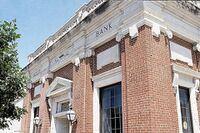Difference between revisions of "NRHP: Packer's National Bank Building"
(Created page with "Packer’s National Bank Building ==Packer’s National B...") |
|||
| Line 3: | Line 3: | ||
==Packer’s National Bank Building == | ==Packer’s National Bank Building == | ||
| − | NRHP Reference #: 85001071 | + | NRHP Reference #: [https://npgallery.nps.gov/AssetDetail/NRIS/85001071 85001071] |
NRHP Listing Date: 19850516 | NRHP Listing Date: 19850516 | ||
Latest revision as of 08:09, 22 February 2018
Contents
Packer’s National Bank Building
NRHP Reference #: 85001071
NRHP Listing Date: 19850516
Location
4939 S 24th, Omaha, Douglas County, Nebraska
View this property's location
View all NRHP properties on this map.
Summary
Packer's National Bank, one of three banks that began in the first decade of South Omaha's history, was founded in 1891 to accommodate the growing financial activity of this industrial suburb of Omaha. The city of South Omaha owed its existence to the Union Stockyards Company and its associated meat packing industry. By 1893 John F. Coad, an Omaha banker, had become president and established the Coad family in South Omaha banking for the next seventy-five years. The present bank building, designed by architect Thomas Rogers Kimball, was constructed in 1907 in the Second Renaissance Revival style.
Further Information
Bibliography
About the National Register of Historic Places
The National Register of Historic Places (NRHP) is the country’s official list of historically significant properties. To be eligible for the NRHP a property must generally retain their historic appearance, be at least 50 years old, and have the potential to be documented as historically or architecturally significant at either the local, state, or national level. The National Register of Historic Places is a National Park Service program administered by the Nebraska State Historical Society for the state of Nebraska. Visit the Nebraska State Historical Society's website to learn more about the program.
